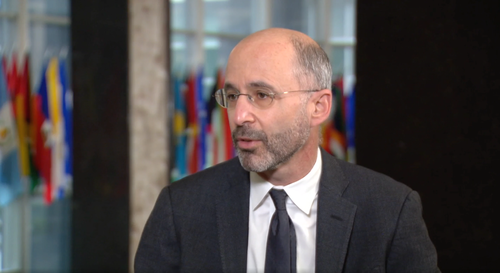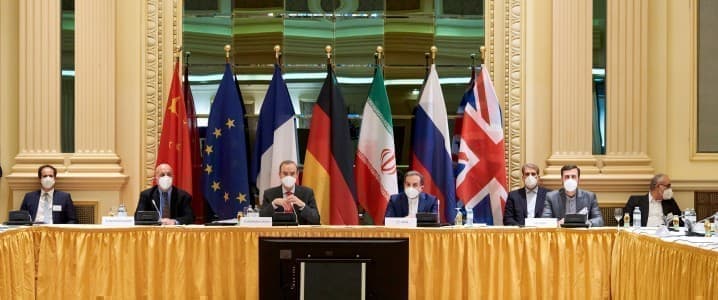For every week that passes without any breakthrough between Tehran and Washington, the prospect of a restored JCPOA nuclear deal looks bleaker. Talks in Vienna have remained stalled for weeks, especially after Iran previously indicated it would not resume negotiations, expected to enter the seventh round, until after hardline cleric and president-elect Ibrahim Raisi enters office on August 3rd.
And now for the first time, the US top negotiator in Vienna is vocalizing "increasing doubts" that deal is possible: "America’s top envoy for the nuclear negotiations with Iran, Rob Malley, is having increasing doubts about whether a return to the 2015 JCPOA agreement is possible, The New York Times reported Saturday," The Jerusalem Post writes.

"There’s a real risk here that they come back with unrealistic demands about what they can achieve in these talks," Malley told the Times, in reference to Raisi taking office Tuesday.
Malley voiced concern over Iran's latest advances as it continues intentionally breaching enrichment caps and terms under the original deal, which began after the Trump administration pulled out in May 2018:
A major concern since Iran froze out IAEA inspectors on May 24, and the negotiations mostly broke down shortly thereafter, has been the experience and scientific knowledge Tehran is achieving by continuing to enrich uranium at the 60% level and by continued use of advanced centrifuges such as the IR-4 and IR-6.
...The 60% enrichment level is two jumps up from the 5% level and considered only one step below the 90% weaponized level. Running hundreds of IR-4s and IR-6s is considered a major achievement that can allow Tehran to conceive of a more industrial-scale program that could eventually enrich sufficient uranium for a nuclear bomb within weeks.
Malley continued by saying of Tehran's being poised to pursue a nuclear bomb if it decided to: "At that point, we will have to reassess the way forward; we hope it doesn’t come to that."
Curious about what a "coordinated response" looks like by UK-US-Israel to Iran's alleged attack on Mercer St tanker.
What can they agree on that is harsh enough to satisfy Israel's goal of deterring Iran from future attacks but also mild enough not to upset fragile JCPOA talks?
— Raf Sanchez (@rafsanchez) August 3, 2021
However, Iranian leaders have long deemed nuclear weapons 'un-Islamic', as the Ayatollah said over the years, and assert the country's nuclear program is for peaceful domestic energy purposes.
Vienna talks are expected to continue later this month, however, what appears to be developing and growing tit-for-tat 'tanker war' incidents - such as last Thursday's drone attack on an Israeli-linked tanker in the Arabian Sea, threaten to further complicate the already stalled negotiations.
By Zerohedge.com
More Top Reads From Oilprice.com:
- Shell Reports $5.5 Billion Net Profit And Hikes Dividends
- Analysts See Oil Trading Closer To $70 Through Year-End
- Why Norway Won’t Give Up On Oil & Gas



















Without the United States agreeing first to lift the sanctions, Iran won’t even negotiate with the Biden administration. On the other hand, the United States won’t lift the sanctions without Iran agreeing to renegotiate the nuclear deal and therein lies the problem.
From the United States’ point of view and its allies’, renegotiating the deal means Iran’s relinquishing its nuclear and ballistic missile development programmes which Iran will never do.
Iran has been successfully managing to evade US sanctions and export an estimated 1.5 million barrels a day (mbd) or 71% of pre-sanction level with China alone reported to be importing up 1.0 mbd and India buying a big chunk of the remaining exports. Therefore, Iran might not be that keen to reach an agreement with the United States at any cost. Moreover, Iran has been emboldened by the 25-year comprehensive strategic cooperation agreement it signed with China on the 27th of March this year.
Furthermore, the geopolitical balance in the Gulf region has been tilting towards Iran. Iran’s geopolitical reach has been enhanced by the newly-completed Goreh-Jask oil pipeline which allows Iranian crude oil exports to bypass the Strait of Hormuz thus enabling it to shut or block the Strait of Hormuz in a war situation or for political reasons without hindering its own oil exports.
The American negotiators might even have to contend with the reality that Iran might be happy by the level of success it has achieved so far in evading US sanctions. It might even think that a continuation of sanctions is a small price to pay for forcing the ejection of US military presence from Iraq, Syria and eventually the entire Middle East thus achieving a spectacular geopolitical victory over the United States.
Iran’s hardline president Ibrahim Raisi supported by the Islamic Revolutionary Guard Corps (IRGC) could derail the negotiations over the nuclear deal until they get a deal on their own terms.
Dr Mamdouh G Salameh
International Oil Economist
Visiting Professor of Energy Economics at ESCP Europe Business School, London